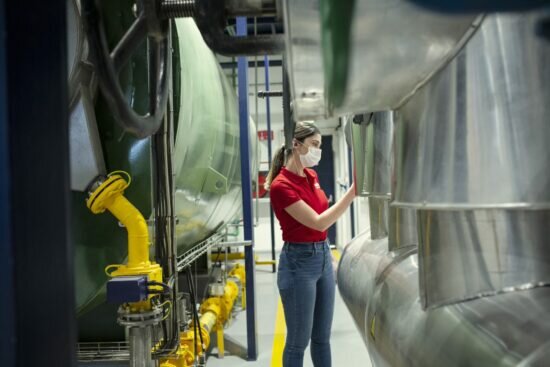
The continued and growing urgency of climate change has triggered a gathering momentum for nations and businesses to step up their fight against this threat and accelerate actions.
At the G7 Summit in June, world leaders committed to reach net-zero carbon emissions by 2050, halve collective emissions by 2030, and increase and improve climate finance by 2025. With these commitments, leaders are signaling that decisive action must be taken to avoid the most significant impacts of climate change.
Visionary leaders share the ambition of limiting global temperature rise to 1.5 degrees Celsius and are implementing strategies to match the ambition of world governments by cutting emissions across value chains. The impacts of climate change coupled with concerns from employees, consumers and shareholders demand this, and the business community is responding.
For example, within the last few months, P&G, HP and FedEx have all announced accelerated climate action goals to achieve net zero emissions by 2040. In fact, one in five of the world’s 2,000 largest publicly listed companies are now committed to a net-zero emissions target, according to Energy and Climate Intelligence Unit (ECIU) and Oxford Net Zero.
Stabilizing the climate will require strong, rapid, and sustained reductions in greenhouse gas emissions, and reaching net zero CO2 emissions. However, making meaningful, measurable progress is a monumental task, and each path to carbon neutrality looks different for every business.
Effective strategies and tools to support the necessary shift toward carbon neutral economies have already been developed. Carbon pricing remains one of the most effective tools to foster and incentivize emissions reduction, and it has the potential to transform the way industries and economies compute for the risk of climate changes.
An Effective Long-Term Tool to Achieving Ambitions
At Philip Morris International (PMI), the transformation of our company is intrinsically and intimately linked to our overall sustainability strategy. As such, we recently published our Low-Carbon Transition Plan (LCTP), a transparent and detailed roadmap that explains how we plan to achieve our climate ambitions, measure success, and report on our progress, while accelerating our decarbonization efforts. The LCTP outlines our new ambitions to achieve carbon neutrality in our direct operations in 2025—five years earlier than previously announced—and net zero emissions in our entire value chain by 2040—10 years earlier than the original target, with carbon reductions in line with the 1.5°C Science-Based Targets.
To achieve these ambitions, an increasing number of organizations, PMI included, are using internal carbon pricing to structurally drive a reduction in CO2 emissions. Furthermore, as businesses see carbon pricing as an important consideration in achieving net zero ambitions, global business groups are working together to call on governments to agree on an international carbon price approach.
PMI’s approach to carbon pricing includes the introduction of two complementary internal carbon pricing tools: a shadow price of USD 65 per ton of CO2e and a carbon levy of USD 8 per ton of CO2e. The shadow price helps in the prioritization of business cases for investment in activities aimed at structurally reducing carbon emissions, while the carbon levy helps size the investments required today to further decrease unavoidable GHG emissions through offsetting and insetting initiatives.
Transparency in Practice and Progress
As companies strive to broadcast their latest sustainable achievements, the need to match clear climate targets with action and transparency is required. This is particularly critical when enacting a carbon pricing strategy.
To guide our decarbonization efforts, PMI created the Portfolio of Climate Investments (PCI), an initiative that will provide transparency in the company’s emission compensation activities. The PCI’s Advisory Committee is responsible for managing and allocating budget to climate investment solutions along three main lines of intervention: purchasing high-quality carbon credits to support short-term neutrality targets; investments in insetting projects within PMI’s value chain to support long-term net-zero ambitions; and investments in innovative technologies that can help remove carbon from the atmosphere. Implementing proactive strategies that integrate carbon pricing investments and transparent climate-related disclosures help businesses move faster towards their net-zero target.
Transparency is accountability which positions businesses to better address stakeholder concerns about disclosure, prepare for future policies restricting carbon emissions, and demonstrate continued commitment to being a sustainability-forward company.
A Roadmap for Progress
These are just the initial steps of what will be a long road ahead for PMI and for the rest of the world. In order to ensure long-term success, it is critical that each business leader makes sustainability part of the ongoing business decisions and considerations, putting in motion a virtuous machine of changes of business practices, focus and investments that future generations will benefit from. The commitments and progress that global businesses and governments have made so far encourage me to move faster in this direction, and that the world is finally on the right track towards a low-carbon economy and a better planet.
Massimo Andolina, SENIOR VICE PRESIDENT, OPERATIONS - Mr. Andolina became Senior Vice President, Operations in January 2018. He joined Philip Morris in Lausanne in 2008 as Director, Operations Planning. He became Vice President, Operations of the Latin America & Canada Region in 2011, and moved to oversee our European Union Region’s operations two years later. In 2016 Mr. Andolina was appointed Vice President, PMI Business Transformation. Prior to joining PMI, Mr. Andolina held a variety of international positions in strategic marketing and general management for Tetra Pak International and in operations for R.J. Reynolds International. Mr. Andolina holds a degree in mechanical engineering from the University of Palermo, Italy, and an MBA from IMD in Lausanne, Switzerland.